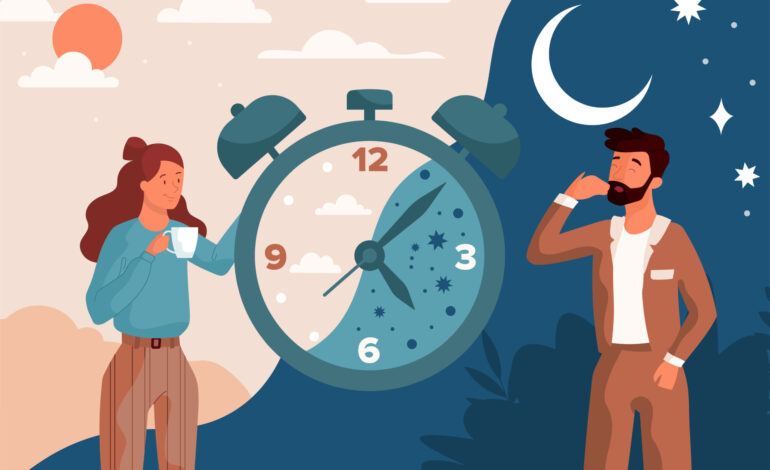
In the hustle and bustle of modern life, where screens glow late into the night and caffeine fuels our days, achieving a good night’s sleep can often feel like an elusive dream. However, the key to restful nights may lie in a natural and ancient phenomenon known as the circadian rhythm. Understanding this internal clock can be the gateway to unlocking the secrets of better sleep and overall well-being.
What is the Circadian Rhythm?
Your body has this built-in 24-hour clock, kind of like a natural schedule. We call it the circadian rhythm, and it’s not just a human thing — it’s in plants and animals too. Picture it as your body’s internal conductor, keeping everything in tune.
Now, the brain is like the boss in charge of this operation, specifically an area called the hypothalamus. This boss takes cues from the outside world, mainly from the light and darkness around us. When the sun rises, it signals to your brain, “Hey, time to wake up!” As the day rolls on, your body temperature goes up, you feel more alert, and you’re ready to tackle whatever comes your way. But here’s the interesting part: as the day winds down and the sun sets, your body gets the message to start winding down too. The brain kicks in, saying, “Alright, let’s prepare for some shut-eye.” This is when the hormone melatonin gets released, making you feel sleepy and ready to hit the hay.

The Role of Light
Imagine the sun rising in the morning — that natural light tells your body, “Hey, it’s a new day, time to rise and shine!” This exposure to daylight kickstarts your internal clock, making you more alert and ready to take on whatever challenges lie ahead. It’s like a gentle nudge from nature, encouraging you to embrace the day.
Now, as the day winds down and the sun begins to set, the story changes. Reduced exposure to light, especially the blue light that electronic devices emit, sends a different signal. Your brain receives the message that it’s getting dark, time to wind down and get ready for sleep. This is when your body starts releasing melatonin, a sleepy-time hormone.
Here are Tips for Aligning with Your Circadian Rhythm:
Establish a Consistent Sleep Schedule
When you stick to a consistent sleep schedule, you’re essentially training your body to follow a rhythm. Just like a well-rehearsed dance, your body knows when it’s time to wind down and when it’s time to perk up. This consistency reinforces the natural flow of your circadian rhythm, making it stronger and more effective.
Picture it this way: if you hit the hay at 10 PM tonight and then switch to 1 AM tomorrow, it’s like throwing your body a curveball. Your internal clock gets confused, and it might struggle to figure out when it’s supposed to get sleepy or wake up. It’s like trying to learn a new dance move every day — a bit chaotic, right? But when you commit to a regular sleep schedule, you’re giving your body the gift of routine. It’s a clear signal that helps your internal clock tick along smoothly. Your body knows when it’s time to produce melatonin, the sleepy hormone, and when it’s time to switch on the alertness mode.

Limits Evening Screen Time
your body’s getting signals from the world around it all the time. When the sun sets, it’s like a cue for your body to start winding down. That’s when melatonin, the sleepy hormone, gets the green light. But, and it’s a big but, the blue light from screens sends a signal to your brain that it’s still daytime. Imagine trying to hit the snooze button while someone’s shining a spotlight in your face — not easy, right? That’s kind of what’s happening when you’re glued to your screens late at night. The blue light suppresses melatonin production, making it harder for you to get sleepy and fall into a peaceful slumber.
So, next time you’re tempted to scroll through your phone late into the night, consider giving your eyes and brain a break. Your body will thank you by making it easier to slip into a restful sleep, without the glow of screens getting in the way. It’s a small change with big sleep benefits — worth a shot, right?
Create a Relaxing Bedtime Routine
Engage in calming activities — that’s the key. Picture it like a gentle transition from the hustle of the day to the calm of the night. Grab a book and let the words take you to another world. It’s not just about reading; it’s about slowing down your mind, giving it a break from the day’s buzz. Ever tried meditation? It’s not about floating on clouds; it’s about grounding yourself. Find a quiet spot, take a few deep breaths, and let go of the day’s stress. It’s like telling your mind, “Okay, time to unwind.”
Now, a warm bath might sound like a simple thing, but it’s a game-changer. Imagine the warmth enveloping you, easing tension from your muscles. It’s a signal to your body — “We’re moving from the active part of the day to the restful part.” Remember, it’s not about doing something extraordinary; it’s about doing something consistently. Your body will catch on, and before you know it, that routine will become a signal for sweet dreams.
Mind Your Meals

Eating habits play a crucial role in your circadian rhythm, that internal clock that keeps your body ticking. Now, we all love a good meal, but here’s the catch — heavy meals too close to bedtime might not be your sleep’s best friend. Think about it like this: when you eat, your body kicks into gear to digest that deliciousness. It’s like a team of little workers in your stomach getting things sorted. Now, if you toss in a hefty meal right before hitting the hay, those workers are still on the clock when you’re trying to catch some ZZZs.
Consider having your bigger meals earlier in the evening. That way, when it’s time to hit the hay, your stomach isn’t working overtime, and you can settle into sleep with a happy, content body. It’s not about being strict; it’s about being mindful. Pay attention to when you’re eating, and if bedtime is looming, opt for a lighter snack if you’re feeling peckish.
Understanding your body’s circadian rhythm is the cornerstone of achieving restorative sleep and promoting overall health and well-being. By aligning your lifestyle with the natural ebb and flow of this internal clock, you can harness the power of your circadian rhythm to enhance your sleep quality and embrace each day with renewed vitality. So, take a moment to listen to your body’s innate wisdom, and embark on a journey towards better sleep and a healthier life. Sweet dreams await!
RUCHI RATHOR Founder & CEO
Payomatix Technologies Pvt. Ltd.
FOUNDER AND INVESTOR | PAYMENTS PROCESSING EXPERT | MERCHANT ACCOUNT SOLUTIONS | WHITE LABELLED PAYMENT GATEWAY | Dreamer, Creator, Achiever, Constantly Evolving
Website Ruchi Rathor: https://ruchirathor.com
Website Healing Heart https://thehealingheart.me/
Instagram https://www.instagram.com/_ruchirathor_/
LinkedIn https://www.linkedin.com/in/ruchirathor12/
Facebook https://www.facebook.com/ruchi.rathor.magnificient
Tumblr https://www.tumblr.com/blog/ruchirathor-thehealingheart
Medium https://medium.com/@ruchirathor_23436









